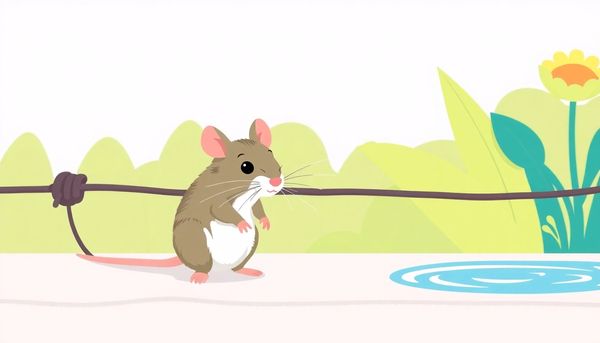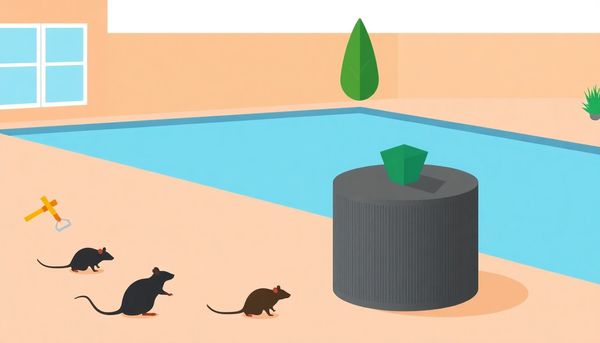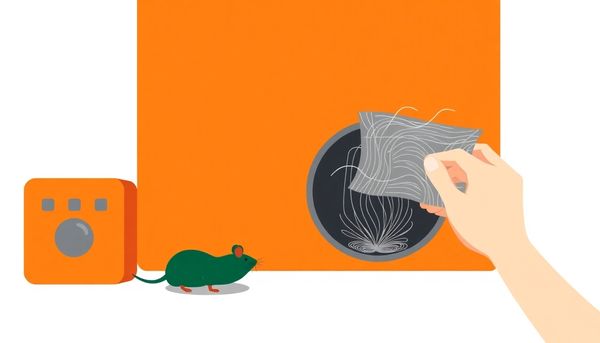Prevent Rodent Damage to Your Pool Heater: Top Strategies
April 12th, 2024
April 12th, 2024
A cozy evening by the poolside may seem like pure bliss, but beneath that serene surface, a hidden challenge often lurks in the form of mischievous mice. These tiny intruders have a knack for finding warmth, and your pool heater is the perfect winter retreat for them. One day, while chatting with my neighbor over the fence, he recounted the saga of his pool heater becoming a rodent retreat, leading to costly repairs. His story served as a wake-up call for me, prompting an urgent need to understand how to safeguard such an essential piece of equipment.
In exploring solutions, it became clear that keeping mice at bay involves more than simply blocking entry points. They are resourceful creatures, able to squeeze through the smallest gaps and nibble on wires that might disrupt the heater’s functionality. The key lies in combining preventive measures with regular maintenance—a strategy that not only protects the heater but also ensures the longevity of your pool's heating system.
Additionally, understanding their behavior can offer clues. Mice are nocturnal and driven by the need for food and shelter. By managing your pool area, reducing clutter, and securing potential food sources, you effectively reduce the allure for these uninvited tenants. Through careful planning and consistent effort, you can enjoy your swim knowing your pool heater remains a mouse-free zone.

When the autumn chill sets in, pool heaters become prime real estate for mice and rodents seeking warmth. These tiny invaders can wreak havoc, gnawing through wires and leaving behind a mess. Once, during a chilly October, a friend spent hours troubleshooting her heater, only to discover chewed cables and nesting debris. It's a headache no pool owner wants, yet easily avoidable with some proactive measures.
One effective strategy involves blocking entry points. Check your pool heater for any gaps or openings, and fill them with steel wool. This material is not only a physical barrier but also deters rodents due to its unpleasant texture. Additionally, placing mothballs inside the control panel can help. The strong odor of mothballs repels mice, as they prefer less pungent surroundings.
For a more robust defense, consider wrapping your heater with quarter-inch hardware cloth. This mesh is tough enough to withstand tiny teeth, ensuring an extra layer of protection. To further enhance the appearance and security of the setup, wooden panels can be added around the heater, keeping everything in place and looking tidy.
For those seeking unconventional solutions, arranging a few rubber toy snakes around your heater adds an unexpected deterrent. It might seem whimsical, but rodents have a natural aversion to serpentine shapes. Before reactivating your pool heater, remove all preventive measures—especially the mothballs—since nobody wants their swim haunted by the scent of mothballs.
Rodent intrusions into pool heaters can be both a pesky and costly issue. When the chill of fall arrives, many homeowners are busy winterizing their pools, but it’s crucial to remember that small animals are also preparing for colder weather. Your pool heater, with its cozy warmth, is a magnet for these critters, making prevention strategies essential.
A friend of mine once found her pool heater filled with chewed wires and debris, a clear indication of unwelcome guests. To prevent such a scenario, begin by inspecting the area around your heater. Look for tiny gaps or openings and fill these with steel wool. Its texture is unappealing to rodents, and they find it nearly impossible to gnaw through.
Next, cover exposed areas with quarter-inch hardware cloth. This mesh acts as a sturdy physical barrier while maintaining a tidy appearance. For an extra layer of deterrence, consider scattering mothballs inside the control panel. Their pungent scent is repellent to mice and rats, helping to keep your heater rodent-free.
As a quirky yet effective measure, place a few rubber toy snakes around the unit. These faux reptiles exploit the natural fear rodents have of snakes and can effectively discourage them from approaching.
Always remember, these safeguards should be removed before operating your heater again. Taking these preventive actions can save you from the headaches of extensive repairs and ensure your heater is in top shape when needed.
When the calendar turns to cooler months, the allure of a cozy pool heater becomes irresistible not just to humans, but to the tiny, unwelcome guests seeking refuge: mice and rodents. To safeguard your investment, installing protective barriers is crucial. Consider the pool heater a fortress and you, the vigilant guardian.
Begin your defense with steel wool, a simple yet effective deterrent. Mice are adept contortionists, capable of squeezing through minuscule openings. Stuffing steel wool into any potential entry points can thwart their efforts. The abrasive texture is unappealing and dangerous if ingested, making it a formidable line of defense.
For those tiny warriors determined to breach the fortress, a secondary layer of protection is essential. Enter quarter-inch hardware cloth. Secure it tightly around your heater. This mesh not only resists gnawing attempts but also blends seamlessly into its surroundings, maintaining the aesthetic appeal of your pool area.
Complement these barriers with decorative wooden panels around the heater. While enhancing the appearance, they also provide a sturdy casing that consolidates your protective strategy. If you feel a bit mischievous, consider placing a few rubber toy snakes strategically around the heater. Their presence may just psychologically deter those with a primal fear of serpents.
Remember to dismantle this fortress when operating your heater. These measures, combined with regular inspections, form a robust defense against mouse invasions. Protecting your pool heater isn’t just about preserving a machine—it’s about ensuring peace of mind for many cozy seasons to come.
Infestation inside a pool heater is not just a nuisance but a potential disaster waiting to happen. When the uninvited guests have already set up residence, the first step is to ensure safety by cutting off power to the unit. This precaution minimizes the risk of electrical shock, a danger not to be underestimated in any DIY endeavor.
Enlisting the help of a professional exterminator can be a wise choice, especially if you're not keen on confronting a nest of squeaky inhabitants yourself. Exterminators have the expertise and tools to evict these squatters effectively. However, if you're up for the challenge, you can tackle the cleanup personally, armed with gloves, a mask, and a hefty dose of courage.
Once the nest is cleared, it's crucial to assess the damage. Mice and their rodent relatives are notorious for gnawing through wires, leaving a trail of potential hazards. If you're comfortable with electrical repairs and have some experience, you might be able to handle smaller fixes. However, for significant damage or if you're unsure about the extent of the repairs needed, reaching out to a certified technician ensures that everything is addressed safely and thoroughly.
Finally, once repairs are complete, take preventative steps to ensure a future invasion isn’t on the cards. By fortifying your heater as described earlier, you’re safeguarding your pool investment against these tenacious critters. Peace of mind is just a few simple steps away.

Chilly evenings usher mice and their ilk into cozy hideaways, and your pool heater becomes prime real estate for these intruders. Keeping them at bay doesn’t require complex strategies. Mothballs, a classic yet effective deterrent, should be your first line of defense. Placing these aromatic spheres inside your heater’s control panel sends a strong "no vacancy" signal, as rodents despise their scent.
Switching gears, consider the physical barriers. Steel wool offers an ingenious solution for sealing small gaps and openings. The unpleasant sensation of the wool deters mice from making a meal out of your heater's inner workings. When woven into these entry points, it transforms them into formidable roadblocks.
For a more visually pleasing and robust barrier, quarter-inch hardware cloth steps up to the plate. This mesh acts as a secondary defense, fortifying the sides of your heater without compromising aesthetics. It withstands gnawing attempts, ensuring your equipment stays intact.
Adding a touch of whimsy, yet surprisingly effective, rubber toy snakes can be strategically placed around the heater. Their presence taps into primal rodent fears, fooling them into steering clear. While these faux reptiles might raise eyebrows, their deterrent power is well worth the gamble.
Before reigniting your heater, meticulously remove all these protective measures. This precaution ensures that your swimming sessions don’t carry the unwelcome fragrance of mothballs mingled with pool water. A little proactive effort can save a lot of frustration, leaving you with a smoothly running heater and peace of mind.
The natural inclination for mice and other rodents to seek shelter in warm places when the temperatures dip can turn your pool heater into an irresistible hideaway. To ward off these uninvited guests, scent-based deterrents offer a surprisingly effective solution. Mice rely heavily on their sense of smell, which means introducing odors they despise can act like a virtual 'keep out' sign.
Consider peppermint oil, a pleasant aroma to most humans but a pungent deterrent to rodents. Soak cotton balls in peppermint oil and strategically place them around the heater’s perimeter and inside any accessible areas. Every few weeks, refresh the scent to maintain its effectiveness. Your local garden store may also carry sachets filled with dried herbs like lavender and cloves, which similarly repel mice.
Another option involves commercial rodent repellents. These products often combine essential oils with other ingredients to create an inhospitable environment for mice. Remember to follow the manufacturer’s guidelines for safe usage, especially around heating equipment.
Anecdotal evidence from seasoned pool owners suggests these scent barriers create an invisible force field against rodent intrusions. They're a simple, non-toxic way to deter mice, adding an aromatic layer of protection to complement physical barriers like steel wool or hardware cloth. Taking these aromatic precautions doesn’t just protect your heater; it ensures peace of mind, allowing you to focus on the joy of a well-maintained pool.
Unexpected guests can wreak havoc on your pool heater, but sealing entry points effectively can turn your heater into a fortress mice and rodents won’t dare infiltrate. One autumn, I noticed an unusual silence when I fired up my pool heater—no comforting hum, just dead air. That’s when I learned the hard way about the sabotage a sneaky mouse can cause. Since then, I’ve mastered the art of fortifying my heater, and it begins with securing every possible entrance.
Begin by arming yourself with steel wool, a simple yet mighty tool. These tiny critters can wiggle through gaps the size of a dime, but steel wool acts as a formidable barrier. When rodents gnaw on it, their mouths suffer, discouraging further attempts. Next, consider installing quarter-inch hardware cloth over larger openings. This material blends durability with aesthetic appeal, not allowing rodents a second look.
Additionally, a strategic placement of mothballs within the control panel offers an olfactory shield. Rodents detest the smell, finding it unbearable. For an unconventional twist, deploy rubber toy snakes around the heater's perimeter. They may seem like child's play, but they cleverly exploit a rodent’s instinctual fear of predators.
Lastly, ensure all protective measures are in place only when the heater is off. Before reigniting it, remember to clear away all deterrents, sparing yourself the aroma of heated mothballs. By taking these steps, you’ll spare your heater—and your wallet—from unexpected repairs.
Mice might not be on your guest list, but they certainly have a knack for gatecrashing. As a first line of defense, consider installing physical barriers around your pool heater. Begin by inspecting every nook and cranny of the heater's exterior. Even the smallest opening can be a welcome mat for rodents. Seal these gaps with steel wool. This material acts not only as a physical barrier but also deters mice due to its unpleasant texture and potential harm if ingested.
For an additional layer of security, use quarter-inch hardware cloth. This sturdy mesh can be wrapped around the heater, creating a fortress-like enclosure that is both rodent-proof and visually unobtrusive. Remember to secure it tightly, ensuring there are no loose edges that can be pried open by tenacious paws.
Wood panels can then be strategically placed around the heater, doubling as both an aesthetic improvement and a stabilizing force for your other protective measures. This not only gives the heater a cleaner appearance but also reinforces the steel and mesh layers beneath.
In a curious twist, placing rubber toy snakes near the heater can serve as a psychological deterrent. Mice have an inherent fear of snakes, and even these faux versions can make them think twice about approaching.
These physical barriers should be removed before operating the heater to ensure safety and functionality. By investing a little time and effort into these installations, you can keep your pool heater rodent-free, preserving its integrity and ensuring it’s ready to warm up those chilly swims.

Embracing a preventative mindset can save you from the headache of dealing with unwelcome guests in your pool heater. As the chill of fall nudges mice and other rodents indoors, your pool heater becomes an attractive sanctuary. To keep these unwelcome tenants at bay, a few strategic steps can make all the difference.
Begin by examining the perimeter of your pool heater. Look for even the smallest crevice and plug them with steel wool. This material is not only affordable but also acts as an effective barrier, deterring rodents with its abrasive texture. Beyond this, consider installing quarter-inch hardware cloth, which serves as a sturdy, chew-proof shield.
The aroma of mothballs, while not the most pleasant for humans, is particularly off-putting to rodents. Tuck a few inside the control panel to create an invisible fortress. Meanwhile, for those who enjoy a touch of whimsy, consider the surprising effectiveness of rubber snakes scattered around the heater. Although they might spark a chuckle, their presence plays on the primal fear rodents have of snakes.
When implementing these measures, it's crucial to remember that these are seasonal defenses. Before reigniting your pool heater, all protective materials should be removed to ensure safe operation. Through these simple yet effective steps, you secure peace of mind and save yourself from costly repairs. After all, a little preparation now can keep your pool heater running smoothly when you need it most.
When autumn winds usher cooler days, the shadows bring along unwelcome guests—mice and their rodent relatives. Armed with tiny paws and sharp teeth, they seek warm hideaways, and your pool heater might just be their dream home. To thwart these sneaky invaders, adopting some simple yet effective rodent-repellent measures is key.
First, unleash the power of scent. Mothballs, though not the most pleasant aroma for humans, work wonders to deter rodents. Place them strategically near the control panel, letting their pungent smell ward off any curious intruders. But take heed—when pool season resumes, ensure these scent-bombs are gone to avoid an olfactory assault when you ignite the heater.
Structural defenses come next. Steel wool is your ally here; its coarse texture is a nightmare for nibbling critters. Stuff it into every conceivable crevice, blocking their potential entry points. Complement this by wrapping quarter-inch hardware cloth around the heater. This robust barrier not only secures your investment but also maintains a neat appearance.
For an added touch of whimsy and practicality, consider deploying rubber toy snakes around the heater. Mice instinctively shy away from serpents, and even a fake one can send chills down their spines. While it might sound amusing, these faux reptiles can be surprisingly effective.
By engaging these measures, you not only preserve your pool heater but also ensure a rodent-free environment. So, take a moment to safeguard your equipment—it’s a small effort for a significant peace of mind, ensuring smooth operations when cooler nights beckon the heater back to life.
As autumn leaves begin their yearly descent, tiny invaders eye your pool heater as prime real estate. These furry trespassers have a knack for finding their way into the smallest crevices, turning your cozy heater into a rodent hostel. To thwart their ambitions, steel wool emerges as a surprisingly effective ally.
Steel wool might not seem like much at first glance, resting innocuously on hardware store shelves. Yet, its metal fibers become a formidable obstacle for mice attempting to squeeze into your pool heater. When stuffed into any openings or gaps, this material forms a prickly barricade. Mice, driven by instinct, attempt to gnaw through, only to encounter its sharp, unforgiving texture. The deterrent is immediate; the tiny fibers can injure their mouths, persuading them to seek easier shelter elsewhere. Should any rodent persist, the steel wool's indigestibility ensures they won’t make a second attempt.
When sealing openings, it’s essential to be meticulous. Mice can slip through spaces as small as a dime, so thoroughly inspect the heater’s nooks and crannies. Pairing steel wool with hardware cloth can further bolster defenses, creating a layer they can't penetrate or chew. The combination of these materials not only secures your heater but also maintains its aesthetic appeal, ensuring your pool area remains both functional and inviting. By taking these steps, you're investing in peace of mind, keeping your heater rodent-free and ready to warm those crisp autumn nights.
Securing your pool heater against mice is much like fortifying a castle against invaders. Deterrents can be your best allies in this battle. Begin with the offensive aroma of peppermint oil. A few strategically placed cotton balls soaked in this oil can act as a powerful repellent. While you might find the scent pleasant, rest assured, rodents do not share your enthusiasm for minty freshness.
Another line of defense involves deploying ultrasonic pest repellers. These devices emit high-frequency sounds that, while inaudible to human ears, create an unbearable environment for mice and rats. Place these gadgets near your pool heater, ensuring they cover the areas where mice might be tempted to intrude.
Predator urine granules, available at outdoor stores, can also play a crucial role. Sprinkling these around the heater mimics the presence of natural predators, making it less likely that rodents will feel comfortable settling in.
For a crafty touch, consider using natural predator decoys, such as owl or hawk statues. While these might seem more decorative than functional, the sight of a looming predator can be unnerving enough to send potential pests scurrying away.
Each deterrent adds a layer of protection, turning your pool heater from a tempting sanctuary into an unwelcoming fortress. With these measures in place, your heater stands a much better chance against unwanted rodent guests.

Steel wool might not be the first thing that comes to mind when fortifying your pool heater, but its defensive qualities are unmatched in the battle against rodents. My neighbor once shared how he thwarted a mouse invasion with nothing more than this trusty material. He swore by it, and the results spoke for themselves. A piece of steel wool, strategically placed, can transform into a formidable barrier against tiny invaders.
Rodents are notorious for squeezing through the most minuscule openings. A gap that seems insignificant to us is an open door to them. That's where steel wool comes in handy. Press it into any crevices or holes around your pool heater. The texture is unpleasant for mice, and as they attempt to gnaw through, the fibers can injure their mouths, prompting them to retreat.
A single afternoon of inspection, armed with a roll of steel wool, can save you from potential headaches down the line. Be thorough; even the smallest oversight can lead to an unwanted guest setting up camp. A tiny crack can be a rodent’s expressway to your heater’s wiring. By blocking these routes, you’re not only preserving the functionality of your equipment but also avoiding costly repairs.
In essence, steel wool acts as a silent sentinel, standing guard around your pool heater, ready to protect it from any furry intruders. Your proactive effort today ensures seamless pool heating tomorrow, giving you peace of mind during those cooler nights.
The chill of autumn sends mice on a quest for warmth, and your pool heater stands as an inviting haven. One highly effective way to deter these unwelcome guests is to arm yourself with a simple yet powerful tool: steel wool. The idea of mice slipping through minuscule gaps may seem like fiction, yet these agile creatures can squeeze through holes the size of a dime. That’s where steel wool comes in.
Steel wool acts as an inexpensive yet formidable barrier. Start by thoroughly inspecting your pool heater for any small openings or crevices. Pay particular attention to areas around cables and vents where the tiniest gaps may exist. Once located, tightly pack these spots with steel wool. Mice attempting to gnaw their way through will soon find their efforts thwarted, as the abrasive wool not only irritates but can also cause harm if ingested. This makes it an effective deterrent.
Having used this method for my own garage, I can vouch for its effectiveness. It's a straightforward task that requires little more than a keen eye and a bit of patience. For added security, once you've stuffed the openings, cover them with quarter-inch hardware cloth to maintain aesthetics while providing another layer of protection. In essence, taking the time now to seal your heater with steel wool can prevent costly repairs and unwelcome surprises when you need your pool heater the most.
Moth balls, those tiny yet potent deterrents, can become your best allies in the battle against rodents seeking refuge in your pool heater. An unexpected yet effective solution, they emit a strong, pungent odor that rodents find utterly repulsive. By placing moth balls strategically within the control panel of your pool heater, you can create a boundary that mice and rats are reluctant to cross. These small spheres are easy to obtain and won't break the bank, making them a practical choice for homeowners seeking quick and affordable protection.
Years ago, my cousin faced a rodent invasion in her garage. It wasn't until she discovered the power of moth balls that the situation turned around. Inspired by her success, I adopted this method for my pool heater, and the results were impressive. While these pests may be determined, their sensitive noses lead them to retreat when confronted with such a strong scent.
However, it's crucial to note that moth balls are only one piece of the puzzle. For best results, accompany them with other preventative measures, like sealing entry points with steel wool and using hardware cloth as an additional barrier. Remember to remove the moth balls before operating the heater to avoid any unpleasant odors or potential hazards. With this approach, your pool heater remains a fortress against unwelcome guests, ensuring smooth operation when those chilly nights call for a dip in a warm pool.
In the battle against rodents, a simple yet effective ally emerges: hardware cloth. This unassuming mesh can be a game-changer in safeguarding your pool heater from unwelcome furry tenants. Unlike traditional wire mesh, hardware cloth is durable and resistant to gnawing, making it an ideal choice for blocking off entry points.
Hardware cloth comes in various gauges, but a quarter-inch size strikes the perfect balance for this task. It allows ventilation while keeping rodents at bay. Begin by measuring the openings around your pool heater. Armed with wire cutters and gloves, trim the cloth to fit snugly over any gaps or vents. Secure it firmly using staples or screws, ensuring no area is left vulnerable.
Think of hardware cloth as a personalized fortress for your pool heater. A friend of mine was initially skeptical, but after a minor rodent invasion cost him a costly repair, he gave it a try. Since installing hardware cloth, his pool heater has remained untouched, and his peace of mind fully restored.
Combining hardware cloth with other deterrents like mothballs and steel wool elevates your defense strategy. While these solutions might seem tedious, consider the alternative: a broken heater when you least expect it. In the game of protecting your pool heater, a bit of effort today can save a heap of trouble tomorrow.

Pool heaters, though essential for a comfortable swim, often double as cozy havens for unwelcome rodents, especially as the mercury drops. Preventing these uninvited guests requires a proactive approach with strategic barriers. Start by gathering materials like mothballs, steel wool, and quarter-inch hardware cloth—all easily available at your local hardware store without breaking the bank.
Begin by placing mothballs near the control panel of your heater. Their pungent odor is a powerful deterrent to mice, steering them away from your prized equipment. Next, meticulously stuff steel wool into any small openings. Mice can squeeze through shockingly tiny spaces, and steel wool presents a painful obstacle should they attempt to gnaw through it.
For an added layer of protection, wrap the heater with quarter-inch hardware cloth. This metal mesh is not just functional, but also visually discrete, ensuring your backyard aesthetics remain intact. It serves as a formidable barrier that rodents find challenging to breach.
To enhance these defenses, consider surrounding the heater with wooden panels. These panels help secure all your deterrents in place, while also giving your pool area a polished look. And for a surprising touch, scatter a few rubber snakes around the heater. Though it might sound whimsical, these faux reptiles play on primal fears, adding another psychological hurdle for rodents.
Remember, all these measures should be removed before operating your heater again. A little preparation goes a long way in keeping your pool heater rodent-free, saving you from costly repairs and ensuring a warm, inviting swim whenever you desire.
Sometimes a small effort can prevent a big headache. Protecting your pool heater from mice doesn't just save you from frustration—it shields your wallet from costly repairs. Those pesky critters are drawn to the snug warmth of your heater, and once inside, they wreak havoc by gnawing on essential components. Implementing effective rodent-deterrents can keep these uninvited guests at bay and maintain the efficiency of your pool heater.
First, consider nature’s own deterrent: peppermint oil. Rodents can't stand the strong aroma, so dab a few drops on cotton balls and strategically place them around the base of your heater. This natural method is both pet and child-friendly, ensuring a safe environment while keeping rodents away.
Next, seal the deal with steel wool. It's a time-tested trick: stuff it into any gaps or entry points where mice might sneak in. The abrasive texture of steel wool is unpleasant for rodents, making it a formidable barrier. Pair this with a fine mesh screen to cover vents and larger openings, offering an added layer of protection without obstructing airflow.
For a high-tech touch, ultrasonic pest repellents emit frequencies that deter rodents without disturbing humans or pets. Place these devices near your heater for continuous, hassle-free protection.
These steps form a robust defense against rodent invasions. With a bit of foresight and these simple solutions, you can ensure your pool heater remains safe and sound, ready to warm up those chilly swims without any unwelcome surprises.

This article provided insights into maintaining your pool. Start your pool care journey today!
Want to become a pool maintenance expert? Our free Pool School course covers everything you need to know about pool care. From basic maintenance to advanced troubleshooting, you'll learn how to:
Join over 10,000 pool owners who have already transformed their pool care routine. Get started with our free Pool School course today!